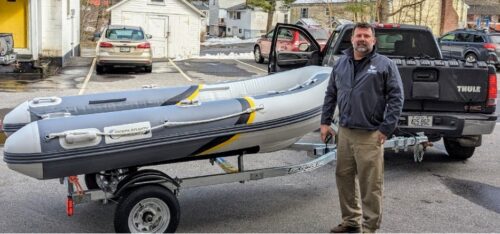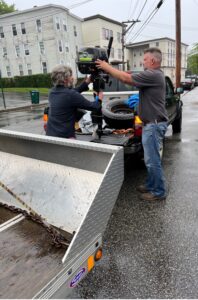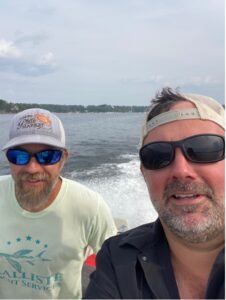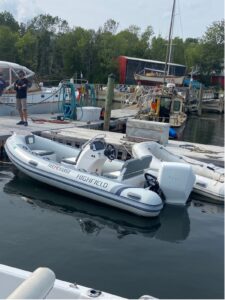As more electric outboard motors quietly emerge on Maine’s harbors, lakes, and waterways, a pressing question surfaces: who will maintain and repair them?
As an organization dedicated to the long-term goal of electrifying Maine’s working waterfront, Island Institute convened a team of partners to develop a pioneering two-part education and training initiative. These courses are a collaboration between Island Institute, educators and administrators from Mid-Coast School of Technology (MCST) with critical curriculum and funding from Kennebec Valley Community College (KVCC) through the Maine Jobs and Recovery Plan to address the growing demand for skilled technicians in the electric boating industry.
The Level 1 online course, launched in December 2023, introduced electric boats to a broad audience. With the groundwork laid, it was time to shift focus to Level 2. The Level 2 course is designed for boat yard technicians and marine service providers to equip them with the essential skills in electric outboard motor maintenance and repair.
Thanks to the great work of volunteer Ed Scott, a retired electrical marine instructor and owner of Bayside Marine, we had a solid foundation for the content of Level 2. What was missing were instructors who could take that curriculum and adapt it for our intended audience – boat yard technicians and marine service providers.
Bobby Deetjen, the director of MCST, looked to his staff of seasoned professionals and experienced educators in the Career & Technical Education program. Among them were Joel Rowland, marine technology instructor, and Dan Hupp, small engines instructor, both keenly interested in the project. Since last spring, they have been involved in developing this course on top of teaching full-time and running their businesses. To help refine the curriculum, they visited Maine Electric Boat Co. to collect a donated electric outboard and Pendleton Yacht Yard on Islesboro to check out ‘Take Charge’, the electric RIB (rigid inflatable boat) in its fleet used to demonstrate the commercial use of electric motors in partnership with Island Institute.
Dan and Joel know boat yards. They know the rhythm of the seasons, and the needs of the people who work in them. This knowledge has been invaluable in developing the course. For example, the middle of summer is a comparatively slow time for boat yards as fishing and recreational boats have been serviced and are in the water. As a result, the course is being offered this summer in late July and early August as a 2-day, hands-on, boot camp-style intensive.
“My lifelong fascination with mechanics and technology began with RC toys and evolved into a career focused on automotive innovation. From learning about battery charging as a child to embracing hybrid technology at Honda, I’ve witnessed the evolution of cleaner engines and the rise of electric vehicles. Now, as an Electric Boat Course instructor, I’m excited to contribute to the future of electric marine propulsion on Maine’s working waterfront.” – Daniel Hupp
Electric motors are much simpler machines than the widely used gas-powered combustion engine outboards. They do not require the same degree of maintenance and repair, but as Dan Hupp reminds us, all motors, especially those working in salt water, will need some maintenance and repair at some point. By empowering boat yard technicians with expertise in electric outboard maintenance, this initiative not only addresses a crucial need but also ensures a seamless transition for current and future electric boat owners. By addressing ‘Who’s going to fix it?’, Maine’s working waterfronts are better positioned for a sustainable future with electric boats.





